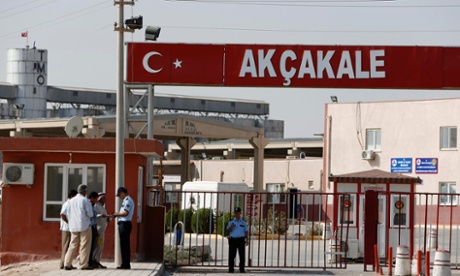
 An analyst believes that the government of Bashar al-Assad in Syria does not have any interest in escalating tensions with the government of Turkish Prime Minister Recep Tayyip Erdogan.
An analyst believes that the government of Bashar al-Assad in Syria does not have any interest in escalating tensions with the government of Turkish Prime Minister Recep Tayyip Erdogan.
The comment comes as the NATO military alliance has approved Turkey’s request for the deployment of Patriot surface-to-air missiles along its border with Syria. On November 21, Ankara formally asked NATO to deploy the surface-to-air Patriot missiles on its border with Syria. In response, NATO Secretary General Anders Fogh Rasmussen said the alliance would consider the Turkish request “without delay.”
On November 23, Damascus censured Ankara’s plan to deploy the Patriot missiles, calling it another act of provocation by the government of Turkish Prime Minister Recep Tayyip Erdogan.
Press TV has conducted an interview with Sharif Nashashibi, chairman of the Arab Media Watch in London, to further talk over the issue. The video also offers the opinions of two additional guests: Tahsin al-Halabi, a political analyst from Damascus, and James Jatras who is the former US Senate foreign policy analyst from Washington. What follows is an approximate transcript of the interview.
Press TV: Is Turkey facing a serious threat from Syria and is that threat strong enough to warrant Patriot missiles?
Nashashibi: I do not personally think so. I do not think the government in Syria would have any incentive or interest in ratcheting up tensions with Turkey. Turkey is the far more powerful neighbor of the two and the regime in Syria has enough problems internally without opening up a new front with Turkey.
There have been cross border incidents but I do not think there would be any large-scale movement of troops or large-scale fighting between Syrian government forces and Turkish forces.
I do not think either side would want that and as such I feel that the Patriot missiles in Turkey… I mean there might be a precaution but I do not seriously think they will be needed because I just do not think it is in the interest of either country to escalate tensions, particularly the Syrian government.
I just do not think, it will be shooting itself in the foot hugely to further anger Turkey. So I think the Patriot missiles are a precaution but I do not think they will be used.
Press TV: Would you say the comparison being made there with Iraq that this could be used as an excuse to launch a military strike on Syria? What Vladimir Putin has said is a Libyan-style scenario.
Nashashibi: It is very worrying that in Obama’s previous warning to Syria about its chemical weapons, apparently there were plans being drown up for potentially having American forces on the ground if weapons were used or even moved. So this is deeply worrying.
I think it would be very ill-advised on the part of the US government primarily because firstly this would suck US forces into a quagmire in Syria and it would be opposed by many in the opposition and their supporters who are against the Syrian regime. I mean they would be against US forces on the ground.
The opposition has mainly been asking for material support from its backs but not to have foreign troops on the ground, particularly US forces because they have a very bad reputation in the Middle East of meddling and intervention in the countries of the region.
So I think this would be a grave step and this would backfire immensely not just on the US but it would harm the Syrian revolution itself. So I think this would be a very bad move on the part of the US.
Press TV: Basically what is your idea about what Syria would look like after a military invasion? If we suppose that President Assad does fall, who is going to be holding Syria in its hands? We have got a large number of militants from different backgrounds; we have got an opposition abroad, an opposition inside.
Nashashibi: This is a big problem. At the moment, there is a great level of unity among the opposition than there has been towards toppling the regime but the question of what next after the regime falls is still very much a problematic one.
There are still different factions in the opposition, some of them diametrically opposed in terms of their vision for Syria afterwards and I do not see that this is being bridged effectively. This is going to be a major problem.
But I have to respond to the guest in Syria [Tahsin al-Halabi]. The idea the Syria is only sympathetic to the Palestinian cause and to Lebanon because of Bashar al-Assad and his father is nonsense. I mean Syrians are sympathetic to the resistance regardless. It is not because of the regime that they feel that way. So please let’s not assume that if Assad falls, the Syria post Assad is going to be a wonderful friend of Israel. This is just nonsense, I’m sorry.
You know, yes, it is very much an open question of what Syria will look like after Assad but in terms of its policies towards the Palestinians and generally towards Israeli aggression in the region, this is not going to change. Syrians are sympathetic to the Palestinians and opposed to Israel regardless. It is not their leadership that feels that way and forces the people to be that way, the people feel that way.







